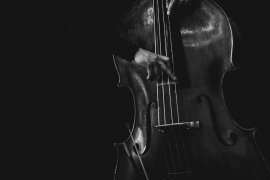I first noticed our family stalker on the same day Alice Hemper wet her pants. There was a commotion by the cake table where a dozen eleven-year-old girls had gathered for my sister’s birthday. Alice Hemper was Katie Hemper’s kid sister. She was only six—my age—and she’d spent too much of that June afternoon guzzling orange soda. Now she was squatting in the grass like our dog, Bitsy, her hands clutching a bottle of Nehi in a sticky grip.
“C’mon, girls,” my mother said. “Let’s go inside.”
She corralled the gawkers towards our kitchen while I stole glances at the dark petals blooming from the center of Alice’s purple sundress.
“Stop staring,” my mother ordered. “Catch up with the others,”
Her gaze was fixed on the road beside our house where a rust-bitten blue Monte Carlo had stopped in the street by our lawn. The only person in the car was a gooey lump of a man. Thin black hair stuck to his scalp in unexpected clumps. His face was a grinning dough ball punctuated by uneven yellow teeth and a unibrow.
“Who is that?” I asked.
My mother ignored the question. She nudged me closer to the kitchen door and stayed in the yard until the last of the girls had settled around the table.
In minutes she burst inside with the cake in her hands. She led a chorus of “Happy Birthday” with such cheer that I almost didn’t notice her pull the sliding door shut and latch the deadbolt.
Later I slipped away from the cake cutting to check on the man in the Monte Carlo, but he was gone.
After the last of the party guests left, I found my mother alone in the kitchen washing dishes and asked her about the man in the car.
“Don’t go near Joe, sweetheart” she said. “He’s looking for something.”
For the next twenty-one years, Joe Timbura studied us from the front seat of his father’s car. If I took a book to the front porch, Joe would pull up and chase me back inside before I finished the first chapter. When my mother planted roses, Joe lingered until she ran to fetch my father. Memories of summer sunburns and twilight laughter flicker beside Joe’s looming silhouette. Nearly every July barbecue, graduation celebration, and outdoor birthday party ended with the haunted hum of a car engine. Yet the more Joe watched us, the more convinced I became that we were worth watching. My mother kept her hair steam setter pressed and fussed over wrinkles and waistlines. My father read the paper and wore suits with suspenders. Our dimples, our flowers, our lives shined in a picture of Kodachrome perfection.
The old people in the neighborhood knew Joe Timbura as “Little Joe,” the only living son of “Big Joe” Timbura, a widower who lived at the end of our block. Once my father knocked on the Timburas’ front door to confront Little Joe. Nobody answered. An hour later, Big Joe appeared at our doorstep. He was a fragile-looking man with paper-thin skin and ropy veins that ran up his forearms and his neck. His posture was hunched in a way that made him look folded and overwhelmed.
I invited him inside, but he declined. He told me to get my mother and my father. My parents stood arm-in-arm in the doorway. My sister and I sat on the stairs and eavesdropped.
“I’m sorry about my boy,” he said. “He was his mother’s son.”
A few of the old-timers in the neighborhood remembered Big Joe when he drove the Monte Carlo with Estelle at his side and a cigarette dangling from his lips. Back then Estelle knew how to keep the mum bushes that lined their walkway thick and golden. Big Joe had muscles and a tan and two sons instead of one. Then came the war in Vietnam and the tumors in Estelle’s head. The mum bushes outside the Timbura walkway disintegrated into bundles of dry stalks. The Monte Carlo wheezed with old lungs for an engine and his only living son lurked in the shadows while Big Joe watched his life dissolve through rheumy eyes.
All through childhood and adolescence, Little Joe was a legendary bogeyman who elevated our tall tales and summer games of tag. When we were in the yard with our dog Bitsy, the Monte Carlo would cough and creak to a full stop. If one of us ran inside to tell our parents, Little Joe drove away slowly. I have no memory of him below the waist. No panting. No moaning. No indecent exposure. He never even opened his car door and spoke to us. All he ever did was stop and stare.
Years later I took a photograph of my sister on her wedding day. She was standing on our front porch between our mother and father, her veil rippling in gauzy waves above her head. In the right corner of the photograph is the barely visible front fender of a Monte Carlo. The picture is the last photograph I took in the house and the last time I saw Joe Timbura behind the wheel of his father’s car.
One-by-one our neighbors moved away and took fragments of our childhood with them. Cancer withered our parents down to shadows until they traded our home for hospital beds. My sister divorced and went to Denver. I never left.
Some nights I drive past our old house and the house where Katie Hemper lived with her kid sister, Alice, and the house where Little Joe lived with his father. I stop at Joe’s driveway and stare at the people in the windows. Little Joe doesn’t live there anymore, but I keep watching. If I ever see him, I’ll tell him that I know now what I didn’t know then. I’ll tell him that I know how easy it is to break, how close we are to breaking.
Martha (“Marty”) Keller is a teacher from the suburbs of Chicago. Her work has appeared in Storyteller and The Writer’s Journal. She was also a semi-finalist in the American Short Fiction contest judged by Lauren Groff, and she is a reader for Flash Fiction Magazine.
Like what you’re reading? Get new stories sent to your inbox every Monday.
Drop your email below to start >>>




